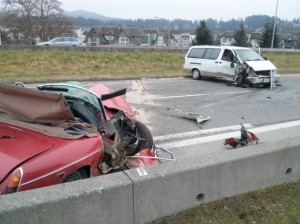Police Pursuit
Post Updated, March 12, 2017
(Note: If you go to one of the links, please do an arrow return to the main story, as the post links feature is not creating a new tab)
While there are many factors that contribute to the decision of an officer to either continue or call off a pursuit, the accident in the above photo, which occurred on January 18, 2014, (Times Colonist News Report) might have been avoided had a police pursuit earlier in the day not been called off. The danger, of course, had the earlier pursuit continued, an equally tragic accident may have occurred. The police were caught in that “damned if you do, damned if you damned if you don’t” dilemma.
For a police officer in pursuit, the adrenaline rush is significant. If the pursuit ends in the arrest of a suspect, that person is well advised to mind their “p’s and q’s”. If they don’t, they could easily end up on the short end of a nightstick. It’s easy, in retrospect to criticize the police. however, the situation is more complicated. This aspect of police pursuit is discussed more fully in the reference paper noted at the end of this story.
This post was originally made a few years back and is being updated here.
Police Pursuit: Public Debate and
Department Policy
Introduction
The following short stories outline various cases of police pursuit, some humorous, but most having the potential to end in tragedy either during the chase or following the chase having been called off.
In cases that end in tragedy, with the driver or passenger of the pursued vehicle, a policeman or in the worst case, an innocent third party, being injured or killed, the media devolve into a feeding frenzy. From the police perspective, it is a tough call as there is seldom less than a few seconds to make a decision – to pursue or not to pursue. If the decision is to pursue, at what point should it be called off as being to dangerous?
Time of day, the amount of traffic, speeds involved, prior knowledge of the vehicle pursued as stolen or involved in a violent crime, and dozens of other factors all come immediately into play. Over the course of my career I was involved in several dozen high-speed pursuits the majority of which resulted in the arrest of the driver, but on occasion, when it became too dangerous to continue, the pursuit was terminated. On a few occasions, accidents resulted when either the suspect vehicle or my police car became involved in an accident.
Pursuits most frequently arise when an officer observes a speeding vehicle or some other traffic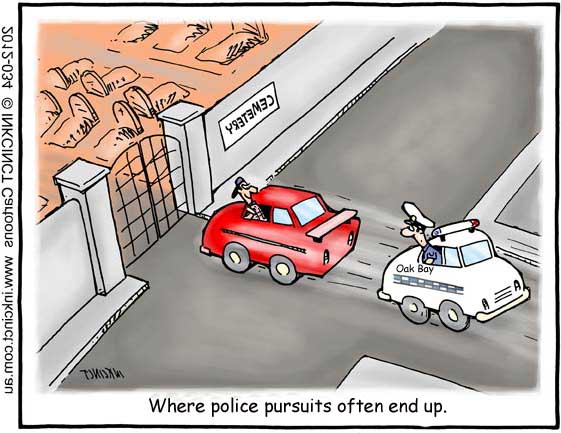 violation being committed. The first decision – when to activate the red light and siren to effect the stop?
violation being committed. The first decision – when to activate the red light and siren to effect the stop?
If the officer were to put on the lights a block or two behind, the offending driver might think an opportunity exists to slip away with a couple of strategic turns. This would almost guarantee at least a short pursuit depending on the reason the driver did not want to be pulled over in the first place. Face it, the pursuit of a suspect, whether on foot or in the vehicle, provides an adrenalin rush difficult to match. The temptation to pursue is great.
As far as getting a vehicle to stop quickly, the better option, when traffic conditions permit, is to move within touching distance, before engaging the lights and siren. This is particularly relevant at night when traffic is light and when a marked police car not as readily visible.
The following stories provide examples of police pursuit cases that resulted in a variety of outcomes with each demonstrating the fine line between life and death.
1. Christmas Tree Shopping – The Hard Way
As in most cities, Christmas Tree Vendors crop up on many Service Station and Mall parking lots in early December. The vendors often pulled a small trailer onto the site where he or she would set up camp for two or three weeks.
The trailer not only provided a bit of shelter and respite from the sometimes foul weather but also provided on-site security against the occasional ‘Grinch’ who might decide to pluck a tree after regular business hours.
 One large lot was regularly set up in the service station on the North-East corner of the Shelbourne and Hillside. About 2:00 am, one quiet morning in mid-December, the radio came alive with a call from one of the Oak Bay Constables advising he was in pursuit west on Lansdowne Road and passing through Cadboro Bay Rd. This particular officer was prone to a heightened sense of urgency both in voice and action. Now, it was not uncommon, when involved in a pursuit for one’s voice to move up an octave or two, but for this officer his voice and tempo of speech became frantic. The weather clear, and while it had been snowing on and off for a couple of days, the roads were in generally good condition.
One large lot was regularly set up in the service station on the North-East corner of the Shelbourne and Hillside. About 2:00 am, one quiet morning in mid-December, the radio came alive with a call from one of the Oak Bay Constables advising he was in pursuit west on Lansdowne Road and passing through Cadboro Bay Rd. This particular officer was prone to a heightened sense of urgency both in voice and action. Now, it was not uncommon, when involved in a pursuit for one’s voice to move up an octave or two, but for this officer his voice and tempo of speech became frantic. The weather clear, and while it had been snowing on and off for a couple of days, the roads were in generally good condition.
I was in my patrol car driving south on Henderson Road, so when the call came in, I was nearing Lansdowne Road when first the suspect vehicle, then the police car, with lights and siren engaged pass through the intersection of Foul Bay Road. Both vehicles were traveling at an estimated 60-70 miles per hour. I joined in about two blocks behind and watched as the vehicle passed by the Lansdowne School at Richmond Road. Saanich and Victoria Police were alerted to the chase.
Rather than going straight through towards Hillside Ave, the suspect driver decided to cut through the Service Station lot not knowing it was filled with Christmas Trees. After leaving the road at high speed, the driver, when confronted by the barricade of trees, simply crashed through heading for Shelbourne Street and the Hillside Shopping Centre.
As I approached, I could only watch as the marked police car, in close pursuit, followed the suspect through the trees. Trees and barricades flew in all direction. As the two cars crossed over the curb onto Shelbourne to head north, both were covered tree branches and snow, with each dragging a couple of trees in the undercarriage of their cars.
At the moment I passed (down to the intersection and right), I observed the resident of the small trailer standing by his front door with trees strewn about, wondering what in hell had just happened. His lot was trashed from one end to the other as the two cars went screaming through, one with red light’s flashing and siren whaling full blast. The cars had missed the trailer by mere inches.
The man appeared to be OK, so I continued North on Shelbourne to find the errant driver, with his windshield, smashed and one flat tire, stopped just short of Cedar Hill Cross Road. The Oak Bay Officer was out of his car, gun drawn and screaming at the driver to get out of his vehicle.
I assisted in the arrest (always good to get your name on the report as it could be a ‘leaner’ in court) and helped place the suspect in the police car. It turned out the driver, a young man in his late teens, had stolen the car some hours earlier and was out for a ‘joy ride.’ The arresting officer returned the driver to Oak Bay for processing while I went to the Christmas tree lot to speak with the operator.
The man was less than impressed with the mess made of his lot but, as it turned out, not that many trees were damaged and it would take less than an hour to put things shipshape for the morning opening. There is no doubt the owner would have an amazing story to pass around over the Christmas season.
Consider for a moment, how this chase would be viewed if the lot owner, the teen driving the car, the policeman or some other person on the roadway, had been seriously injured or killed?
2. Two Lucky Guys
As mentioned other stories, in the early hours of the morning with the engine of the police car turned off and the radio turned down, it was possible to hear great distances across the city. The sound of a siren or a speeding vehicle could be heard for several kilometers. While parked at Foul Bay Road and Cadboro Bay Road (one of my favourite fishing holes in the wee hours of the morning), I could hear a car coming in at high speed, likely along Pandora or Fort.
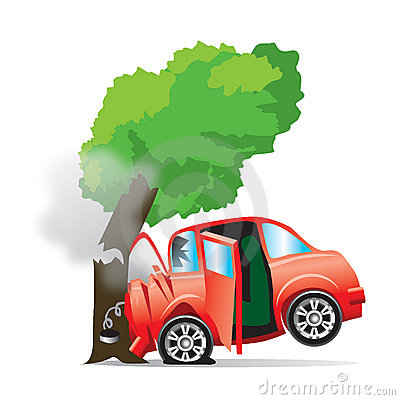 I radioed another patrol car to cover off Oak Bay Avenue at Foul Bay Road. Less than a minute later the other officer reported the vehicle just passed through Foul Bay on Oak Bay traveling at over 70-80 mph. As the other officer initiated pursuit, I headed south and hoped to intersect at some point.
I radioed another patrol car to cover off Oak Bay Avenue at Foul Bay Road. Less than a minute later the other officer reported the vehicle just passed through Foul Bay on Oak Bay traveling at over 70-80 mph. As the other officer initiated pursuit, I headed south and hoped to intersect at some point.
At 70 mph, a vehicle covers roughly one block every five seconds, so it would be impossible for me to catch them without traveling at over a hundred miles an hour. That was not going to happen, so I drifted south waiting to see which direction the suspect might travel. I did not wait long, as within three minutes the pursuit vehicle reported the suspect hit a tree on Newport Ave only a few blocks from my new position.
Clearly, the officer at the scene would have his hands full, so while in route I radioed for an ambulance expecting serious injuries to be reported. Approaching the scene, a severely damaged Mustang was wrapped around giant Oak on the south boulevard. Fifty feet further down Newport, the V8 engine from the Mustang was sitting upright on the centre line of Newport Ave with pipes smoking as it rocked back and forth. In retrospect, it was a comical scene as it looked as if the engine was still trying to elude the police.
Both the driver and passenger were lying on the boulevard after having been ejected from the vehicle, one on each side of and beyond the Oak tree. Amazingly, both appeared to be only slightly injured, and both were highly intoxicated. Ah, but which man was the driver? The guy on the left side of the tree was the most likely suspect, but it would take more than that in the event of a court case.
In a strange twist, it was noted both men were in their stocking feet. It only took a second to determine both pair of shoes were in the car, one pair on the drivers side, one on the passenger. As both men had different sized feet, with Mr. Largefoot’s shoes on the driver’s side. That would become one piece of evidence for, as the old saying goes, “if the shoe fits wear it.” The vehicle was also registered to the suspected driver, and as other bits of evidence were found including statements from both, it was decided to proceed to a breathalyzer test.
Both men were taken to the office, where BTA test provided a reading of .17%, about double the level for impaired driving.
It did not appear the two were involved in anything beyond getting drunk and driving around like idiots. It was indeed fortunate that neither they nor some innocent third party was injured or killed as both the other officer and myself had attended accidents with far less damage in which people were killed.
3. What Might Have Been!
Early one morning, the Victoria Police became involved in a high-speed pursuit of a Corvette last observed traveling east along Dallas Road toward Oak Bay at 70+ MPH. Oak Bay and Saanich units were placed on alert and it was not long before one Oak Bay Unit reported the Corvette was traveling north on Foul Bay Road in excess of 70 mph as it blew through red lights at Oak Bay then Fort Street.
I was traveling west on Cadboro when the vehicle blew through. Even though traffic was light, it was a fatality looking for a place to happen. As I turned north on Foul Bay Rd., only the vehicle taillights disappearing in the distance were observed. Saanich Units were on the look-out, with one unit spying the suspect vehicle on Cordova Bay Road traveling north from Royal Oak Drive. It was the last sighting by police in Greater Victoria.
A day or two later an APB was circulated advising there was an overnight gun shop robbery in Nanaimo and the owners (a man and his wife I believe) were found dead. No other further information could be developed concerning the identity of the culprits.
A week or two later, the Ontario Provincial Police (OPP) in a small town in Northern Ontario town were checking out a report of a possible stolen Corvette sitting at a motel. When two officers went to check a room, shots were fired and a stand-off began. Before it was over several more shots were exchanged between the suspects and police. One suspect was killed and the second taken into custody. Found in the room were numerous firearms that could be traced back to the Gun Shop in Nanaimo. The man arrested was charged with murder as well as several other offences.
Of course, it soon became clear the sequence of events leading back to the pursuit of the Corvette through Greater Victoria some weeks earlier, was established. Had any of the police officers in Victoria succeeded in stopping and arresting the men, two innocent people would not have died.
But, also consider, what if during the pursuit, someone was killed. Would the police be criticized after the fact? Of course, they would, as ‘hindsight’ provides greater clarity to the situation. So, when should a pursuit be called off.
4. Calling off a Pursuit
While it is difficult to make that call to quit, at times, it is just too dangerous to continue. One afternoon about 3:00 pm just as school was getting out, another officer was running radar in south Oak Bay near the Monterey School when a car flashed through the School Zone. The officer immediately attempted to stop the car, but the chase was one – for a very short time.
At 3:00 pm just as school was getting out and there were kids all over. The danger created was extreme as the suspect was traveling at nearly 60 mph in a School Zone. The vehicle was last observed going north on Foul Bay Road from McNeill Avene. I was near the Oak Bay High School driving an unmarked vehicle when the suspect vehicle blew the red light at Fort Street and headed in towards the city. I tried to edge in behind.
Although it did not seem likely the suspect knew I was coming up, he blew another red light at Richmond Road and continued driving in an extremely erratic manner (passing in the oncoming lane, etc.). I gained some distance and stayed close for a minute so, but in making a passing maneuver, I was involved in a minor accident just east of Richmond Road.
By now the City Police had dispatched cars to cover both Fort and Pandora. Two cars tried to block the suspect as he came down the hill heading toward Cook Street but he cut off down a side street that, fortunately, happened to be a dead-end. Two City Police cars closed in on the suspect and with guns drawn ordered him from the vehicle.
It only took a few minutes to establish the man was mentally deranged and, if left to his own devices, it is difficult to say what he might have happened. While this all worked out after the chase was initially called off, it was a tough decision to make on the part of the original pursuing officer. In this case the driver was committed to hospital for observation.
5. Police Pursuit Driver Training
At one point in the mid to late 1970’s the Provincial Police Academy decided to implement a Pursuit Driving Course. As I seemed to be involved in an inordinate number of pursuits (hmm, did I turn on my lights at an opportune moment?), I was sent to the five day course.
The training took place on the Boundary Bay Airport runways where several intersecting roadways were set up using orange cones. Divided about equally between classroom and street, the instructors were individuals who had had considerable race car driving experience and could handle the powerful 1976 Dodge Sedans like they were Tonka toys.
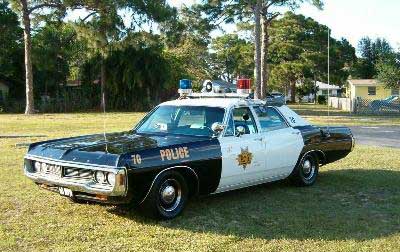
Photo: This 1970s Dodge was very similar to that which we used at the Academy and in many Police Departments, including Oak Bay. The top rack was almost the same.
Our introductory drive included three students piling into a car (4 door sedan) with an Instructor and off we went down the runway – in reverse. As our speed topped 80 mph, the Instructor locked up the brakes and cranked the wheel over hard. With tires squealing and smoke flying the vehicle completed a slow 180 degree turn at which time the Instructor simultaneously released the brakes, pulled the vehicle into drive and hit the gas. We were now traveling forward at nearly the same speed as we had been traveling in reverse. It was a hair raising ride.
The lesson to be learned – a vehicle can be made to do a 180-degree turn from reverse to forward while maintaining a perfectly straight line and while maintaining almost the same speed. The turn could be made in the width a city street by an experienced driver. During the following days we were taught, among other things:
- How to alternately apply and release the gas in order to keep control of the vehicle while negotiating a series of “S” turns (with the proper coordination acceleration and deceleration, the vehicle can be taken through the “S” turns at an amazingly high speed); If the timing is not proper the vehicle rear wheels can break away and the
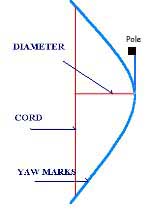 vehicle will begin to Yaw (see diagram).
vehicle will begin to Yaw (see diagram). - A vehicle in a Yaw will continue to turn unless the brakes are applied at which point if will continue in a straight line. Hence, at many accidents on curves, drivers will have hit the only obstruction on that curve because, upon seeing the obstruction coming up while in the yaw, they hit the brakes hard at which point their fate is sealed (reference the straight line in the diagram). ABS braking systems in new vehicles partially (only partially) overcomes this problem;
- Slowing before and then accelerating on entering a curve helps to maintain positive vehicle control;
- That an ordinary street vehicle cannot be caused to roll over on a flat paved surface that does not have any obstructions (curbs, speed bumps, etc.) no matter the torture (or improper driving techniques) you apply the vehicle. But, hit a curb or other obstruction on the road and the vehicle will likely roll over.
- How improperly set brakes can easily lead to a loss of control during breaking.
Each day we would spend several hours putting those Dodge Cornets through their paces until we could master each of the techniques.
On Day 5, when doing our final test runs, my turn came to negotiate the conroed “S” turns and although I did well on the first run, on the second I was determined to add a few miles per hour to my previous speed. To make the final test as realistic as possible we were also required to engage our strobe lights and electronic whalers (we could choose the tone). Clearly, my skill set had not yet reached a sufficient level to handle the extra speed, but in the process, I was able to clearly demonstrate point #4 above.
When my rear wheels broke away near the edge of the runway, they dropped off into the gravel apron and the vehicle immediately rolled. It flipped at least two or three times before coming to rest on the roof. I was belted in and the electronic whaler was still sounding although it had been crushed to the roof of the vehicle.
Now, getting out of an overturned vehicle (for any of you that have tired) when tightly belted in, is no easy task. When you get in your vehicle sometime, push hard against the belt and then try to release the lock. Now think what happens if you are upside down – you are going to fall a few feet before you can re-orient yourself. It was not long before the entire class arrived at the scene to assist in the extrication. The only injury I suffered was a bruised leg where the fire extinguisher (that had broken away from the small metal holder between the bucket seats) had hit me.
It was a very embarrassing moment but was better to have happened in the Academy than on the street. On the final day before we all went our different ways, I was called up and awarded a small “Crash Award”. It was a beat up toy Volkswagen Beetle mounted in an inverted position on a small plaque.
Not more than three or four years later the Academy disbanded the pursuit course as studies found those who had taken the course were involved in significantly more accidents than officers who had not taken the course. It seems that the bit of extra skill we learned during the course caused the graduates to believe they were far more skilled than they were and therefore willing to take more chances. It also demonstrated that learning to apply maneuvers on the street required more skill than a few days training on an Airport runway could provide.
For Your Consideration
After having considered the four cases, take a moment to consider how you might draft a set of regulations that would become Police Pursuit Policy. See if you think it would satisfy the demands of each of the four situations. I suspect you would find the task very difficult just as others within the police community have struggled to define a proper response to this particular type of dangerous situation. If you do come up with something please feel free to post your comments or sent them to my email (harold@mcneillifestories.com).
In the future, police officers will still have to make life or death decisions as an event unfolds, in much the same manner as they have been doing for decades. Officer’s today are much better trained but, then, the there is now much more scrutiny of their behaviour. When things turn out badly, the press will always have a field day, when things turn out well, as is often the case; the matter will likely drift by with barely a mention.
While I have never been one to defend police wrong-doing, careless attention to duty, sloppy police work or internal protectionism, everyone, particularly the media, needs to cut a little slack in those instances where, on the spur of the moment, a judgment call was made after which the situation went south. Police officers and other emergency service workers are seldom given time to sit back and fully analyze a situation before making a critical life or death decision. They act as best they can based on training and instinct. If they waited to consult a supervisor or get legal advice before making the decision, our streets and communities most certainly would not be as safe as they are today.
Harold
Victoria, 2012
Note: More police pursuit stories will be presented at a later date.
Further Reading
Stay Cool in the Heat of the Chase, an excellent web article by a Police Officer.
Blink by Malcolm Gladwell (Published 2005) Provides an in-depth discussion of the process of making snap judgments, just as a police officer must do on a regular basis each day. Unfortunately, the book does not have an index, and there are some excellent comments on this decision-making the process as applied to police officers. I will re-scan the book and see if I can locate the reference points. If you happen to know the reference pages, please send me a note.
(1583)
Tags: Constable Ron Morgan, Police Pursuit, Sgt. Harold McNeill
Trackback from your site.

